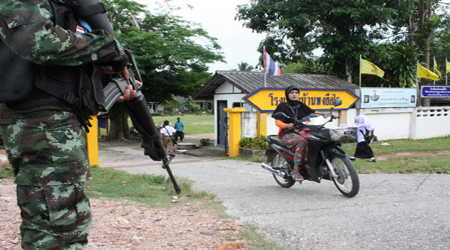A look at Emergency Decree in Bangkok and in the Deep South
The government’s decision to invoke the Emergency Decree to deal with protests in Bangkok led by the People’s Democratic Reform Committee has been subjected to heavy criticism from the Opposition, the protesters and human rights advocacy organizations such as Human Rights Watch alike.

In reality however, this special law has not affected the anti-government protesters who are supposed to be the main target of the law. Nor has the law made life inconvenient or difficult for the general public –thanks to the lame duck government which has, so far, failed to strictly enforce the law.
Because of the ineffectiveness of the enforcement of the law, Bangkokians may have a wrong perception of the law. In contrast, the people in three southernmost provinces who have been living with the law for almost a decade have a completely different perception of the law.
In the case of the Deep South, the Emergency Decree was invoked in the aftermath of the unprecedented blackout of Yala township in mid-July 2005 when insurgents blew up a huge transformer plunging the entire township into darkness. It was followed by over 10 coordinated arson and bomb attacks.
In Bangkok, the saw law was imposed to deal with the protesters’ "Bangkok Shutdown" operation aimed to cripple government bureaucracy.
The decree which is enforced for three months has been extended for 35 times throughout nine years period in the Deep South. The decade-long imposition of the law has raised a question mark about whether the situation in the restive region can still be regarded as emergency situation after almost ten years. Or the situation has become permanently urgent.
Only one district, Mae Larn in Pattani, out of a total of 33 in the Deep South, is not covered by the Emergency Decree. A plan to lift the decree in five more districts which was initiated since the Abhisit administration has been shelved seemingly for good.
There are two levels of emergency situations in the Deep South:
General emergency situation under which authorities are empowered to issue edicts such as curfew, ban against public gathering, media censorship and ban on the sale of certain publications, forced evacuation and ban on the use of certain vehicles or travelling ban on chosen roads.
Serious emergency situations such as acts of terrorism under which authorities can detain a suspect for seven days up to 30 days without charges, press censorship and etc.
More importantly, the decree empowers the prime minister to order troops to help police in law enforcement.
In the Deep South however, the decree was mostly used in search and raiding operations and detention of suspects without charges. Blanket arrests of suspects and detention without charges have caused widespread resentment among many people in the region.
In Bangkok however, the protest situation does not justify the use of the special law as maintained by Mr Thawil Pliensri, former secretary-general of the National Security Council who said that the Criminal Code is enough to cope with the situation.
---------------------------------------------------------------------------------------------------------------------
Caption : Atmosphere in the deep South of Thailand under emergency decree
